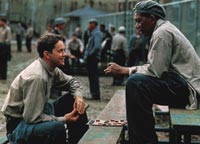 |
If Stephen King writes your nightmares, then this is the one where they send you to jail for a crime you didn’t commit. But, as in so many of his stories, King wants to do much more than scare us out of our theatre seats—and for proof, look no further than The Shawshank Redemption, now briefly showing in theaters on the 10th anniversary of its original release. (A special edition DVD will hit stores on October 5.)
Shawshank charms, intrigues and inspires us, and maybe that’s why it stands at No. 2 in the Internet Movie Database Top 250, an ongoing poll of IMDb users. A remarkably faithful Frank Darabont adaptation of King’s novella Rita Hayworth and The Shawshank Redemption, the movie lost money at the box office in 1994 but went on to bag seven Oscar nominations. And by the time it was in the hands of video vendors, those golden statues that it didn’t quite get and the platinum word of mouth that it did get turned it into a genuine phenomenon.

I admit I wasn’t wowed by it at first, but now I count myself among its fans. I love the film’s easy pace and the welcoming, let-me-tell-you-a-story voice of its narrator—a star-making performance by Morgan Freeman who, after a couple decades in mostly smaller roles in mostly minor films, hit big with stand-out stuff in Unforgiven, Shawshank and Se7en. I love the agonizing tension between how bad the place is and how good the things that happen there can be. It’s dark as hell inside Shawshank prison, but I love watching soft-spoken banker Andy Dufresne (Tim Robbins) kick at it—quietly, relentlessly, for decades—until it bleeds daylight. Robbins shares his co-star’s ease and calm within the role, and director Darabont deserves huge credit for getting performances from every one of his actors that are far removed from the melodrama and hysteria we might expect in a Stephen King potboiler.
Of course, if that’s all we expect from King, we’re not paying close enough attention. The central character in The Girl Who Loved Tom Gordon (1999) is an 11-year-old girl lost in the Maine woods, whose hope comes from imagining herself as her hero, the gritty Red Sox relief pitcher who points to heaven after every save. A glimpse of God? Indeed. In a letter accompanying review copies, King wrote, “I have been writing about God—the possibility of God and the consequences for humans if God does exist—for 20 years now, ever since The Stand,” 21 years earlier.

King grew up poor, his mom working endless crummy jobs to keep her two fatherless boys in food and clothing. He won a Bible for memorizing verses at Methodist Youth Fellowship, watched a lot of movies and spiked countless rejection slips onto a nail he pounded into his bedroom wall, proud testimony to his persistence as he submitted story after story to an endless series of pulp magazines.
He always had an eye for the horrors and cruelties to be found in life—the maggots that bred in restaurant linens he cleaned at an industrial laundry, or the soul-crushing oppression of an impoverished classmate who’d gotten some pretty new clothes and tried to rise above her circumstances. Of that latter event, King wrote (in On Writing): “Someone made a break for the fence and had to be knocked down, that was all. Once the escape was foiled and the entire company of prisoners was once more accounted for, life could go back to normal.” That high school episode fueled the writer’s first best-seller and hit movie Carrie, the story of a girl whose torment leads to horrific, if unintentional, retribution for her tormentors—a less than divine judgment that’s not proportionate or just, but which has the horrible finality of one of Jesus’ more stark and startling parables: “Fool! Tonight your soul is required of you.”
King’s description of that episode also points to one of his central preoccupations: a life stripped of freedom can be hell—the kind you find in a prison cell. But that’s not the whole story: even in such a place, hope can see a person through. The hope of freedom, freedom that’s found in books and music, in hard-won ice-cold beers on a rooftop on a hot and hard-working afternoon. Most of all, the hope that works itself out in friendships, that works itself out in long and persistent efforts to make things, and to make things better.
In The Shawshank Redemption, Andy painstakingly fashions chess pieces out of rocks scrounged from prison workyards. He’s told it’s hopeless, but year after year he sends off letters to state legislators, requesting books and funds to improve the prison library—and I can’t help thinking of the persistent hope of the young King, mailing off his stories to magazine editors. Andy teaches reading, gives free tax advice, asks the name of an anonymous prisoner who’s been beaten to death. Andy bears up under terrible oppression, becoming a favorite target of “the sisters,” inmates who subject him to years of painful abuse—more echoes of high school oppression. And over the years, hope grows: in Andy, in the other prisoners, and especially in Red, the character through whose eyes we view the story. Red is an institutionalized man, a lifer who knows he’s guilty and who has come to accept the very walls that keep him from true freedom.

Viewers who aren’t put off by the inescapable violence of Shawshank may want to check out The Green Mile, another King prison story where the violence (and everything else, spiritual themes included) is much more explicit. Also directed by Darabont, it’s not nearly the film his first one was, marred by a stylistic heavy-handedness that’s glossy and smack-you-in-the-face manipulative.
As King himself suggests, The Stand is also loaded with things for Christians to chew on. It’s one of those post-apocalyptic survival yarns, where the stark setting and life-and-death situations force characters to make impossible moral choices with their survival on the line. Those revealing decisions are clearly shown to have spiritual consequences, as people gradually align themselves with 108-year-old Mother Abigail or the demonic Randall Flagg. King fans say the novel is much better than the sometimes fascinating, sometimes tacky 1994 mini-series (available on DVD), but it’s got its draws: watch for cameos by people like Ed Harris, Kathy Bates and even Sam “Evil Dead” Raimi.
By far the greatest film derived from a Stephen King story is Stanley Kubrick’s treatment of The Shining. Die-hard fans of the novel may be bothered by Kubrick’s departure from the book at key plot points, but most film buffs agree this is a great film made from a potboiler novel. The director zeroes in on the family dynamics and finds the real terror: what’s it like for a boy to fear his father, a wife her husband? Isolated in the snow-bound Outlook Hotel, Jack Nicholson plays an increasingly obsessive writer whose white-knuckle sobriety doesn’t look like it’ll make it to spring thaw. If the film isn’t clearly “spiritual,” it certainly ends up supernatural, but what matters here is the autobiographical: King’s life and family were very nearly destroyed by his own alcoholism, and you have to wonder whether it wasn’t his recovery process that got him relying on the Higher Power who begins showing up with greater and greater frequency in his stories from then on. On Writing includes his understated account of surviving a near-fatal accident, which seems suffused with a sense that he may have been delivered from death in an almost miraculous way.

It’s dodgy to try reading testimony into someone else’s story—just about as dodgy as drawing assumptions about an author from the things his characters say or do, or the way his stories play out. Those who look to Stephen King for the latest celebrity conversion are likely to be disappointed: as much as hope and faith, even Christian faith, are constant themes in his books and movies, he’s quite direct about the whole business when he writes, “While I believe in God, I have no use for organized religion.”
God also shows up in Dreamcatcher, one of King’s most recent novels in which a character describes God as one who “sings the lullaby, helps us to go to sleep when we’re sad and scared.”
Many of King’s stories can indeed leave us sad and scared. Maybe that’s why he works the divine into so many of his tales—like Shawshank—which are filled with hope in the face of horror. King shows a sense that evil is real and must be resisted—and that it is mostly overcome not through magic or violence, but in the heart. The real battle against evil and despair is fought in the hard everyday decisions of ordinary, faithful people who choose not to give in—much like the men in Shawshank.
For more insight on the Christian themes in The Shawshank Redemption, check out:
- Saint Paul Returns to the Movies by Robert Jewett, who devotes a whole chapter to Shawshank and Romans 8, focusing on hope and shame.
- Scripture on the Silver Screen by Adele Reinhartz, who looks at the film through the lens of 1 Corinthians in an essay called “Shawshank Redemption and the Salvation That Lies Within”.
- Reel Spirituality by Robert K. Johnston who ties the movie in with Ecclesiastes under the heading “A Meditation on Friendship”.
- Faith and Film: Theological Themes at the Cinema by Bryan P. Stone, who gives an extensive examination of Shawshank in chapter 14.
- The Great Movies by Roger Ebert, who gets at some of the spiritual themes in his review.
- Online analyses by Heidi Strengell (University of Helsinki) and Steve Lansingh.
Talk About It
Discussion starters- How would you describe Andy’s faith? Has he given it up, or is he living it out? Saint Francis of Assisi once said, “Preach the gospel at all times. If necessary, use words.”
- Even though this film is set almost entirely in an oppressive prison, it’s also filled with images of freedom. Which ones do you notice?
- Early in the film, Andy and the warden exchange Bible quotes. What are they communicating to each other, and what do those passages have to say about true freedom? What other biblical references to you see in the movie? What do they represent?
- Both Red and Andy eventually question their own guilt and innocence. Jesus radicalized the question of guilt and innocence, telling us to look on the heart, on our intentions and desires, not only on our actions. What do you make of the way these characters come to view themselves and their crimes?
A ready-to-download Movie Discussion Guide related to this movie is available at ChristianityTodayMoviesStore.com. Use this guide after the movie to help you and your small group better connect your faith to pop culture.
The Family Corner
For parents to considerThere’s a non-explicit adulterous encounter between Andy’s wife and another man. At the prison, an inmate is beaten to death in a harrowing sequence. Andy is repeatedly sexually assaulted by a small gang of inmates, but the camera always “averts its gaze,” and the sequences are not explicit. There is also a considerable amount of strong language, typical for life inside a maximum security prison.
Photos © Copyright Revolution Studios
What Other Critics Are Saying
from Film Forum, 09/30/04Frank Darabont’s film The Shawshank Redemption, based on a Stephen King short story, was not exactly a box office smash when it was released, but its popularity has grown steadily since its arrival as a video release. It has, in fact, reached and maintained the #2 position at the Internet Movie Database’s Top 100, a list voted on by visitors to the site, for a good while.
This week, as the film returns to some theatre screens to mark its tenth anniversary and the arrival of a special edition DVD, Ron Reed (Christianity Today Movies) takes another look at the its themes and significance. “I love the film’s easy pace and the welcoming, let-me-tell-you-a-story voice of its narrator—a star-making performance by Morgan Freeman. I love the agonizing tension between how bad the place is and how good the things that happen there can be. It’s dark as hell inside Shawshank prison, but I love watching … Andy Dufresne kick at it—quietly, relentlessly, for decades—until it bleeds daylight.”
He concludes by assessing the strengths of Stephen King’s work: “Many of King’s stories can indeed leave us sad and scared. Maybe that’s why he works the divine into so many of his tales—like Shawshank—which are filled with hope in the face of horror. King shows a sense that evil is real and must be resisted—and that it is mostly overcome not through magic or violence, but in the heart. The real battle against evil and despair is fought in the hard everyday decisions of ordinary, faithful people who choose not to give in—much like the men in Shawshank.”
Related Elsewhere:
A ready-to-download Movie Discussion Guide related to this movie is available at ChristianityTodayMoviesStore.com. Use this guide after the movie to help you and your small group better connect your faith to pop culture.
Copyright © 2004 Christianity Today. Click for reprint information.












